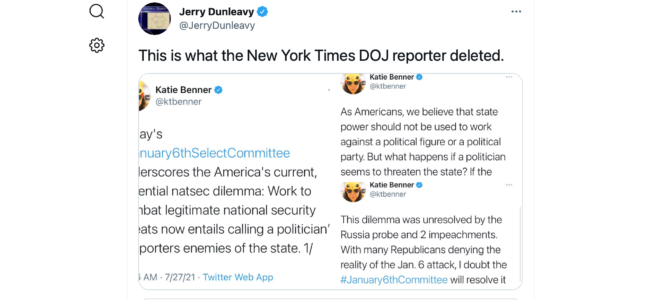
New York Times reporter Katie Benner deleted an important series of tweets this week. The posts, she said, were “unclearly worded.” Clear enough, however, is what they portend for the future.
On Tuesday, Benner tweeted, “Today’s #January6SelectCommittiee underscores the America’s current essential natsec dilemma: Work to combat legitimate national security threats now entails calling a current politician’s supporters enemies of the state.”
Benner continued, “As Americans, we believe that state power should not be used to work against a political figure or a political party. But what happens if a politician seems to threaten the state? If the politician continues to do so out of office and his entire party supports that threat?”
In a third tweet, Benner added, “This dilemma was unresolved by the Russia probe and 2 impeachments. With many Republicans denying the reality of the Jan. 6 attack, I doubt the #January6thCommittee will resolve it either. That leaves it up to voters, making even more essential free, fair access to the polls.”
About eight hours later, the posts were gone. They should not, however, be forgotten. Benner’s posts reflect a set of elite beliefs that are about to make our politics even uglier.
This is what the New York Times DOJ reporter deleted. https://t.co/yzftaBwVoM pic.twitter.com/MVKZA6SsGj
— Jerry Dunleavy (@JerryDunleavy) July 28, 2021
This is the key line: “Work to combat legitimate national security threats now entails calling a current politician’s supporters enemies of the state.” That, according to Benner, is the country’s “essential natsec dilemma.” Presumably Benner was describing the mood of her sources, who are undoubtedly very powerful given the influence of her employer.
Here’s her logic: For the sake of national security, Trump supporters must be broadly categorized as “legitimate national security threats” because Trump “threatens” the state and the GOP “supports that threat.” According to Brenner, Trump supporters threaten the state and must be seen as national security threats. While she’s one of the few people who’ve dared to put it so bluntly, she’s hardly alone in espousing that logic—especially in Washington D.C.
Brenner, it should be noted, is a reporter, not a columnist. Perhaps she deleted the tweets because she meant to attribute that logic to the national security community, not herself. Perhaps she deleted them because her bosses demanded it. Either way, they were anything but “unclear.”
This is precisely why the political establishment’s itch to wage war on “domestic extremism” is dangerous. The legacy media walks in such lockstep with the left that Democrats’ reckless definition inflation is normalized by sympathetic journalists who parrot it, accept it, and legitimize it. This is partially cynical political maneuvering and partially ideological.
That is to say, for some Democrats, it’s a power grab—the kind of thing journalists used to relish challenging. Others truly believe that Trump supporters categorically constitute a national security threat. Benner’s tweets just reference Jan. 6, but the same Ibram Kendi-esque logic is routinely applied to categorically insist Trump supports are bigots, regardless of an individual voter’s race.
This is why every time you look up at CNN and MSNBC, footage of Jan. 6 is playing. It’s partially because Democrats want to keep it in the news for political purposes but also partially because the denizens of our newsrooms and boardrooms and even smoke-filled backrooms are increasingly convinced half the country constitutes a national security threat.
So while it’s essential for our government to monitor and root out genuine domestic terrorism—and that includes Q-Anon crazies and Stop The Steal radicals who make legitimate threats to public safety—new proposals to surveil and incriminate and punish domestic extremists come at a time when people in power increasingly define domestic extremism so broadly as to include roughly half of the country. It’s a nice way for them to feel more comfortable with their classism and ignore their decades of failure.
Brenner’s tweets were not deleted because they were inaccurate. If anything, they were deleted because they were too accurate, because the logical conclusion of this definition inflation is still too radical to say aloud.
This push to broadly categorize and then target the American right on the grounds of national security may wither. It’s obviously absurd and perhaps enough people will see it as such. But as Brenner’s tweets reveal, the momentum is there. Sadly such efforts may ultimately do more to fuel paranoia and conspiracy than quell it.








